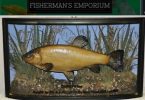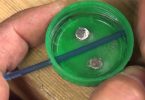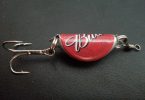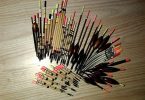Guidance notes prepared by
Dr Bruno Broughton B.Sc. (Hons), Ph.D., F.I.F.M., Fisheries Management Consultant
General Information
Fish leeches are often seen on fish during the winter months, and they cause concern for anglers and fishery managers alike.
Leeches feed by piercing the skin of fish and sucking blood through their specialised mouthparts. Once they are satiated, the parasites can drop off and live on their last meal for a periods of several weeks. They then ‘fish’ for another fish host by anchoring themselves by one of their two suckers to stones or vegetation, moving the free end around in search of a passing fish.
Leeches eggs are small, brown or black, flattened pods which are laid on vegetation, stones or wood debris, often at the water’s edge. After hatching, the young leeches must find a fish host within a couple of weeks.
The presence of one or two leeches on a fish should be of little concern; in larger numbers or where the infection is widespread, treatment or eradication of these parasites is appropriate. Leeches can cause direct wounds to fish and leave sites for secondary infections. They have also been implicated in the passing of more serious viral and bacterial infections from fish to fish.
In conjunction with any treatment, consideration should be given to improving the environmental conditions: leech infestations are often associated with over-stocking with fish, poor water quality, lack of invertebrate food, or mechanical damage (from bad handling, for example).
Treatment
The leeches can be pulled off the fish – with artery forceps, for example – although this will leave many small wounds (and potential sources of secondary infections) if the infestations are severe. Alternatively, the fish could be immersed in a dip tank containing some form of chemical.
One of the easiest to set up is a bath containing a saline solution made with cooking or sea salt (not table salt, which contains potentially damaging additives). A bath containing 25 grams of salt per litre – about four ounces per gallon – is known to be effective. A large, clean bucket or dustbin makes a convenient treatment tank, but remember to fill the tank and let it stand for a few hours to ensure equilibration of the water temperatures in the pond and the tank.
The fish should be placed in the bath for 15-20 minutes, but single fish should be used initially to determine the necessary dip time. If the fish shows signs of distress, remove and transfer it to clean water immediately and dilute the bath.
Eradication
A freshly-cleansed fish can become re-infected with free-living adult leeches or newly-hatched larvae. The only certain means of eradicating both stages of the parasite’s life cycle is:
remove all the fish and store them elsewhere (e.g. in a large, aerated tank);
drain the pond;
leave the bed to dry for a period of about a week – the drying-out will kill the leech eggs;
re-fill the pond and return the fish.
This is relatively easy for a small garden pool; it is not really practical on a large pond or lake. Here, the other options are either to let nature take its course – leeches rarely cause widespread fish losses ‘in the wild’- or apply hydrated (also known as slaked or garden lime) to the water at a concentration equivalent to about 3001b/acre. This can prove partially-effective, although leeches may not be eradicated completely.
In this case, the liming must be undertaken step-wise, applications being restricted to no more than about one quarter of the total area at any one time, with three or four weeks between liming over different areas. For more information on liming, see my previous article on Anglers’ Net.
Advice
For more advice on this or other similar topics, contact me on:







